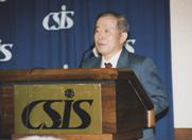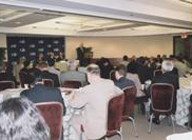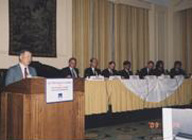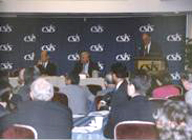Monday, October 2 - Thursday, October 5, 2006
| Date | Monday, October 2 - Thursday, October 5, 2006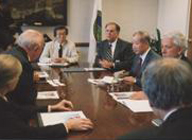 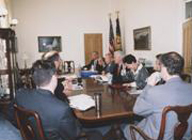 |
|---|---|
| Venue | Washington D.C., Chicago and Los Angeles, U.S.A. |
| Co-hosted | Japan Economic Foundation Chicago Council on Global Affairs (Former Chicago Council on Foreign Relations) Pacific Council on International Policy(PCIP) |
ProgramA BINATIONAL STUDY (U.S. RELEASE EVENTS)
A BINATIONAL STUDY GROUP REPORT "ENGAGING CHINA AND INDIA:
AN ECONOMIC AGENDA FOR JAPAN AND THE UNITED STATES"
AGENDA FOR U.S. RELEASE EVENTS
EVENTS IN WASHINGTON, D.C.
Monday, October 2, 20061030-1130 Multi-bureau State Department BriefingLocation: U.S. Department of State
Study Group Participants:
•Marshall M. Bouton, President
•Kenneth Dam
•Noboru Hatakeyama
•Sakutaro Tanino
Attendees:
Staff from regional and functional bureaus of the U.S. Department of State
1345-1415 Briefing at Department of Energy with the Secretary and staffLocation: U.S. Department of Energy
Study Group Participants:
•Marshall M. Bouton
•Kenneth Dam
•Noboru Hatakeyama
•Sakutaro Tanino
Attendees:
Samuel W. Bodman, U.S. Secretary of Energy
Karen Harbert, Assistant Secretary of Energy for Policy and International Affairs
1600-1700 Briefing at Federal Reserve BankLocation: Federal Reserve Bank
Study Group Participants:
•Marshall M. Bouton
•Kenneth Dam
•Noboru Hatakeyama
•Sakutaro Tanino
•Marina v.N. Whitman
Attendees:
Ms. Karen Johnson, Director of the Division of International Finance
Senior staff from the division of International Finance
Tuesday, October 3, 20060930-1000 Briefing with USTR Susan SchwabLocation: USTR
Study Group Participants:
•Marshall M. Bouton
•Kenneth Dam
•Geoffrey Garrett
•Noboru Hatakeyama
•Akira Kojima
•Sakutaro Tanino
•Marina v.N. Whitman
Attendees:
Ambassador Susan Schwab, USTR
USTR office staff
1115-1145 Briefing at Chinese EmbassyLocation: Embassy of the People's Republic of China in the United States
Study Group Participants:
•Marshall M. Bouton
•Kenneth Dam
•Geoffrey Garrett
•Noboru Hatakeyama
•Akira Kojima
•Sakutaro Tanino
•Marina v.N. Whitman
Attendees:
Zhou Wenzhong, Chinese Ambassador to the United States
Chinese Embassy staff
1230-1330 Luncheon for the official release of reportLocation: Willard InterContinental, Pierce Room
Study Group Participants:
•Marshall M. Bouton
•Kenneth Dam
•Geoffrey Garrett
•Noboru Hatakeyama
•Akira Kojima
•Sakutaro Tanino
•Marina v.N. Whitman
Attendees:
Key thinkers in international economics and Asia affairs, media and scholars
1400-1430 Briefing with Senate Foreign Relations Committee staffersLocation: 450 Dirksen SOB
Study Group Participants:
•Marshall M. Bouton
•Kenneth Dam
•Geoffrey Garrett
•Noboru Hatakeyama
•Akira Kojima
•Sakutaro Tanino
•Marina v.N. Whitman
Attendees:
Keith Luce, Senior Professional Staff Member
1500- 1630 Congressional staffer briefing convened by California Institute in conjunction with Senator Durbin's officeLocation: 2261 Rayburn HOB
Study Group Participants:
•Marshall M. Bouton
•Kenneth Dam
•Geoffrey Garrett
•Noboru Hatakeyama
•Akira Kojima
•Sakutaro Tanino
•Marina v.N. Whitman
Audience:
•Congressional staffers
Wednesday, October 4, 2006845 depart from Washington, D.C. on United Airlines flight #607
950 arrive in Chicago, IL
(flight was delayed for 5 hours due to the ground weather in Chicago)
EVENTS IN CHICAGO, IL
1830-1600 Dinner program cosponsored by The Chicago Council and the JapanAmerica Society of Chicago
Location: Metropolitan Club of Chicago, Sears Tower
Study Group Participants:
•Kenneth Dam
•Noboru Hatakeyama
•Akira Kojima
•Sakutaro Tanino
Audience:
Key Chicago Council members
Board Members of the Japan America Society
Thursday, October 5, 2006800 depart Chicago on United Airlines flight #103
EVENTS IN LOS ANGELES, CA
1026 arrive in Los Angeles, CA
(flight was delayed for 3 hours due to mechanical trouble by the UA)
1400-1600 Afternoon reception and public release eventLocation: Omni Hotel
A Conversation with Mayor Antonio Villaraigosa and Release of a Joint U.S.-Japan Study Group Report
Keynote Speaker:
Hon. Antonio R. Villaraigosa, Mayor, Ciry of Los Angeles
Program Chair:
Mr. John Andrews, West Coast Editor/Los Angeles Bureau Chief, The Economist
Study Group Cochairs:
Noboru Hatakeyama, Chairman and CEO, Japan Economic Foundation
Kenneth Dam, Max Pam Professor Emeritus of American & Foreign Law, The Law School, University of Chicago
Special Introductions by:
Mr. Warren Christopher, Senior Partner, O'Melveny & Myers LLP
Dr. Geoffrey Garrett
Presiden, Pacific Councio on International Policy
Study Group Participants:
•Noboru Hatakeyama
•Kenneth Dam
•Geoffrey Garrett
•Akira Kojima
•Sakutaro Tanino
Attendees:
•Pacific Council members
•Los Angeles business leaders
•Los Angeles-based media
1800 Private dinner hosted by the Japan America SocietyLocation: Omni Hotel
Study Group Participants:
•Noboru Hatakeyama
•Geoffrey Garrett
•Akira Kojima
•Sakutaro Tanino
Attendees:
JAS board members
Links to relevant documents:
ParticipantsMonday, October 2 - Thursday, October 5, 2006List
SummaryA Binational Study Group Report (English)A Binational Study Group Report (Japanese)
2017. JULY 2016. JUNE 2015. SEPTEMBER 2014. DECEMBER 2013. OCTOBER 2013. FEBRUARY 2011. NOVEMBER 2010. OCTOBER 2010. JANUARY 2008. DECEMBER 2007. NOVEMBER 2006. OCTOBER 2006. JULY 2005. SEPTEMBER 2004. MAY 2003. OCTOBER

.jpg)
.jpg)
.jpg)
.jpg)
